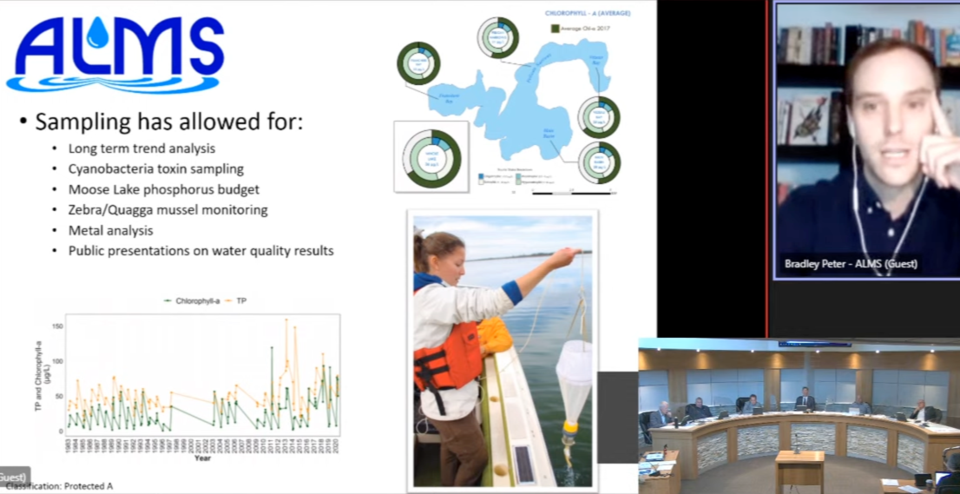BONNYVILLE - Funding for lake monitoring on Moose Lake will continue flowing for another year.
The Alberta Lake Management Society (ALMS) will receive the $4,500 they need to continue monitoring Moose Lake from the MD of Bonnyville.
ALMS, an Edmonton-based charity organization, runs the local Lake Watch program, which has been in operation since 1996.
According to ALMS Executive Director, Bradley Peter, "It’s collecting information on nutrients, water chemistry, physical parameters like your temperature, biological parameters including invasive species data, zebra mussel monitoring, quagga mussel monitoring and a couple of other invasive organisms."
They also keep an eye on cyanobacteria and phosphorus levels.
Since 2002, a big portion of their funding for local lake monitoring has come from the Lakeland Industry and Community Association (LICA). However, in 2020, their contribution was cut by 80 per cent.
"It really put us in a difficult position to continue to deliver this environmental monitoring work in the LICA, MD of Bonnyville region. The program has been a little bit strained these past two years,” detailed Peter.
That's why, he explained, ALMS was approaching the MD about pitching in.
Their ask this year is for roughly $4,500 in order to cover the analytical expenses of the Moose Lake program.
“We have been monitoring Moose Lake very consistently for at least the past 10 years and also conducted some more diagnostic-type studies... We do have long-term trend analysis that we’ve run on the data each year,” explained Peter, adding they've noticed significant changes in terms of water quality in the lake.
Coun. Darcy Skarsen wanted to know what ALMS did with the data they collected and whether it was used to make suggestions to organizations and municipalities.
“In terms of the water chemistry data, there can be recommendations made, especially when it’s incorporated in a more diagnostic study, like a phosphorus budget, which would allow you to make specific recommendations for improving areas of the lake watershed, that’s where Moose Lake is headed right now with the completion of a phosphorus budget,” Peter detailed. "Of course, when it comes to invasive species, the management action would be really more specific... If it’s detected through our program that would trigger a really specific processes through the province, especially if we’re detecting a prohibited invasive species.”
A prime example of somewhere ALMS' data came in handy is Pigeon Lake.
"After the completion of a phosphorus budget in 2013... they developed a Lake Watershed Management Plan, and that’s typically how lakes are managed through the province, is bottom-up, stewardship-driven, watershed management plans,” said Peter. “That has resulted in some changes to bylaws surrounding fertilizer usage and driven some changes around tying into regional septic lines."
He continued, “In terms of managing phosphorus, it’s a very, very challenging task and it’s not entirely driven by watershed phosphorus. In some cases, it’s driven by internal loading of phosphorus, and that’s something out at Moose Lake we will be looking at when the report is released."
Once ALMS has collected the data from Moose Lake, a report will be released, sometime in the spring of 2022.
Most of council was on board with supporting the program, however, Coun. Ed Duchesne wasn't in favour.
“This is hiring a consulting company the province uses and watershed volunteer groups use. I don’t think I can agree going along with supporting that.”
Reeve Greg Sawchuk said the information gathered by ALMS is important for understanding the lake, and while in some cases "maybe there isn’t anything we can do, but maybe getting ahead of it by doing some testing, especially on lakes that the province isn’t paying any attention to, I would support that.”
He added, “I know that, because this is also heavily volunteer-driven, we have people taking their own watercraft out there and putting in hours. They’re very passionate about their lakes... I am big on helping out volunteers, because I think it helps our tax dollars go further."
Council approved the $4,500 expenditure, with Sawchuk noting maybe the MD should take it a step further.
“Maybe we need Alberta Environment Minister meeting... We have a lot of issues going on. We have a ton of lakes out here, it should be one of our primary concerns,” he expressed.



